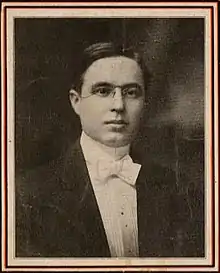Percy Wenrich
Percy Wenrich (January 23, 1887 – March 17, 1952) was an American composer of ragtime and popular music.
Percy Wenrich | |
|---|---|
 | |
| Background information | |
| Born | January 23, 1887 Joplin, Missouri |
| Died | March 17, 1952 (aged 65) New York City |
| Occupation(s) | Composer |
| Instruments | Piano |
| Years active | 1907-1937 |
Person life & career
Born in Joplin, Missouri to Daniel Wenrich and Mary Ray,[1] he left for Chicago in 1901 where he attended classes at the Chicago Musical College.[2] Wenrich moved on to New York City around 1907 to work as a Tin Pan Alley composer, but his music retains a Missouri folk flavor. He composed at least eighteen rags, including "Ashy Africa," "Noodles," "Peaches and Cream" (1905), "Crab Apples," and "The Smiler" (1907). His songs include "Wabash Avenue After Dark" and the hits "Put on Your Old Grey Bonnet"[3] (1909, lyrics by Stanley Murphy), "When You Wore a Tulip and I Wore a Big Red Rose" (1914, lyrics by Jack Mahoney)[2] and "Minnetonka" (1921, lyrics by Gus Kahn).
"If It's Good Enough for Washington, It's Good Enough for Me" (1908, lyrics by Ren Shields) was a song about a homeless man sleeping on a bench in a public square with statues of Washington, Jefferson, McKinley, Grant and Lee.
"If it's good enough for Washington, It's good enough for me,
I'm proud that I am here tonight to keep him company,
I'm proud to sleep out with the man that set our country free,
If it's good enough for Washington, it's good enough for me."
Wenrich married vaudeville performer Dolly Connolly and in 1911 wrote the hit "Red Rose Rag" for her with lyrics by Edward Madden. In 1912, Wenrich and Madden had another hit with "Moonlight Bay." Wenrich and Connolly toured together for many years.[4]
In the late 1930s, Wenrich and several of his fellow hitmakers formed a sensational review called "Songwriters on Parade", performing all across the Eastern seaboard on the Loew's and Keith circuits.
Wenrich's last memorable song "Sail Along, Silv'ry Moon" was published in 1937.[2] He died in New York City in 1952 at the age of 65.[4]
Songs
- 1915 Mothers Must Pay for All (with Jack Mahoney)[5]
- 1917 Where Do We Go from Here? (with Howard Johnson)[2]
- 1918 I Ain't Got Weary Yet (with Howard Johnson)[5]
- 1918 Lambs Gambol (with William Jerome & J. F. Mahoney)[5]
- 1918 You Can Tell That He's an American (with Howard Johnson)[6]
- 1918 Rainbow from the U.S.A., A. (with William Jerome & J. F. Mahoney)[6]
- 1919 By the Camp Fire (with Mabel Elizabeth Girling)[5]
- 1919 Casey (with John B. Kennedy)[5]
See also
References
- Edwards, Bill. "Percy Wenrich". RagPiano.com. Retrieved June 21, 2017.
- "Percy Wenrich | Biography & History | AllMusic". AllMusic. Retrieved June 21, 2017.
- Malcon, Nancy. "Martin to present 'Meet Me In Missouri'". Retrieved March 13, 2017.
- Caldwell, Bill. "Ragtime composer Percy Wenrich was known as 'The Joplin Kid'". Joplin Globe. Retrieved March 13, 2017.
- Parker, Bernard S. (2007). World War I Sheet Music - Volume 1. Jefferson, North Carolina: McFarland & Company, Inc. pp. 67, 74, 247, 349, 424. ISBN 978-0-7864-2798-7.
- Parker, Bernard S. (2007). World War I Sheet Music - Volume 2. Jefferson, North Carolina: McFarland & Company, Inc. pp. 549, 803. ISBN 978-0-7864-2799-4.
External links
- Biography Percy Wenrich, "The Joplin Kid", Parlor Songs.
- The Music of Percy Wenrich, part 1, Parlor Songs.
- The Music of Percy Wenrich, part 2, Parlor Songs.
- Free scores by Percy Wenrich in the Choral Public Domain Library (ChoralWiki)
- audio early 20th century recordings of Wenrich compositions at the Library of Congress jukebox
- Percy Wenrich recordings at the Discography of American Historical Recordings.